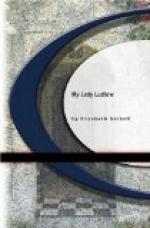Mr. Mountford died quite suddenly at last. We were all very sorry to lose him. He left some of his property (for he had a private estate) to the poor of the parish, to furnish them with an annual Christmas dinner of roast beef and plum pudding, for which he wrote out a very good receipt in the codicil to his will.
Moreover, he desired his executors to see that the vault, in which the vicars of Hanbury were interred, was well aired, before his coffin was taken in; for, all his life long, he had had a dread of damp, and latterly he kept his rooms to such a pitch of warmth that some thought it hastened his end.
Then the other trustee, as I have said, presented the living to Mr. Gray, Fellow of Lincoln College, Oxford. It was quite natural for us all, as belonging in some sort to the Hanbury family, to disapprove of the other trustee’s choice. But when some ill-natured person circulated the report that Mr. Gray was a Moravian Methodist, I remember my lady said, “She could not believe anything so bad, without a great deal of evidence.”
CHAPTER II.
Before I tell you about Mr. Gray, I think I ought to make you understand something more of what we did all day long at Hanbury Court. There were five of us at the time of which I am speaking, all young women of good descent, and allied (however distantly) to people of rank. When we were not with my lady, Mrs. Medlicott looked after us; a gentle little woman, who had been companion to my lady for many years, and was indeed, I have been told, some kind of relation to her. Mrs. Medlicott’s parents had lived in Germany, and the consequence was, she spoke English with a very foreign accent. Another consequence was, that she excelled in all manner of needlework, such as is not known even by name in these days. She could darn either lace, table-linen, India muslin, or stockings, so that no one could tell where the hole or rent had been. Though a good Protestant, and never missing Guy Faux day at church, she was as skilful at fine work as any nun in a Papist convent. She would take a piece of French cambric, and by drawing out some threads, and working in others, it became delicate lace in a very few hours. She did the same by Hollands cloth, and made coarse strong lace, with which all my lady’s napkins and table-linen were trimmed. We worked under her during a great part of the day, either in the still-room, or at our sewing in a chamber that opened out of the great hall. My lady despised every kind of work that would now be called Fancy-work. She considered that the use of coloured threads or worsted was only fit to amuse children; but that grown women ought not to be taken with mere blues and reds, but to restrict their pleasure in sewing to making small and delicate stitches. She would speak of the old tapestry in the hall as the work of her ancestresses, who lived before the Reformation, and




